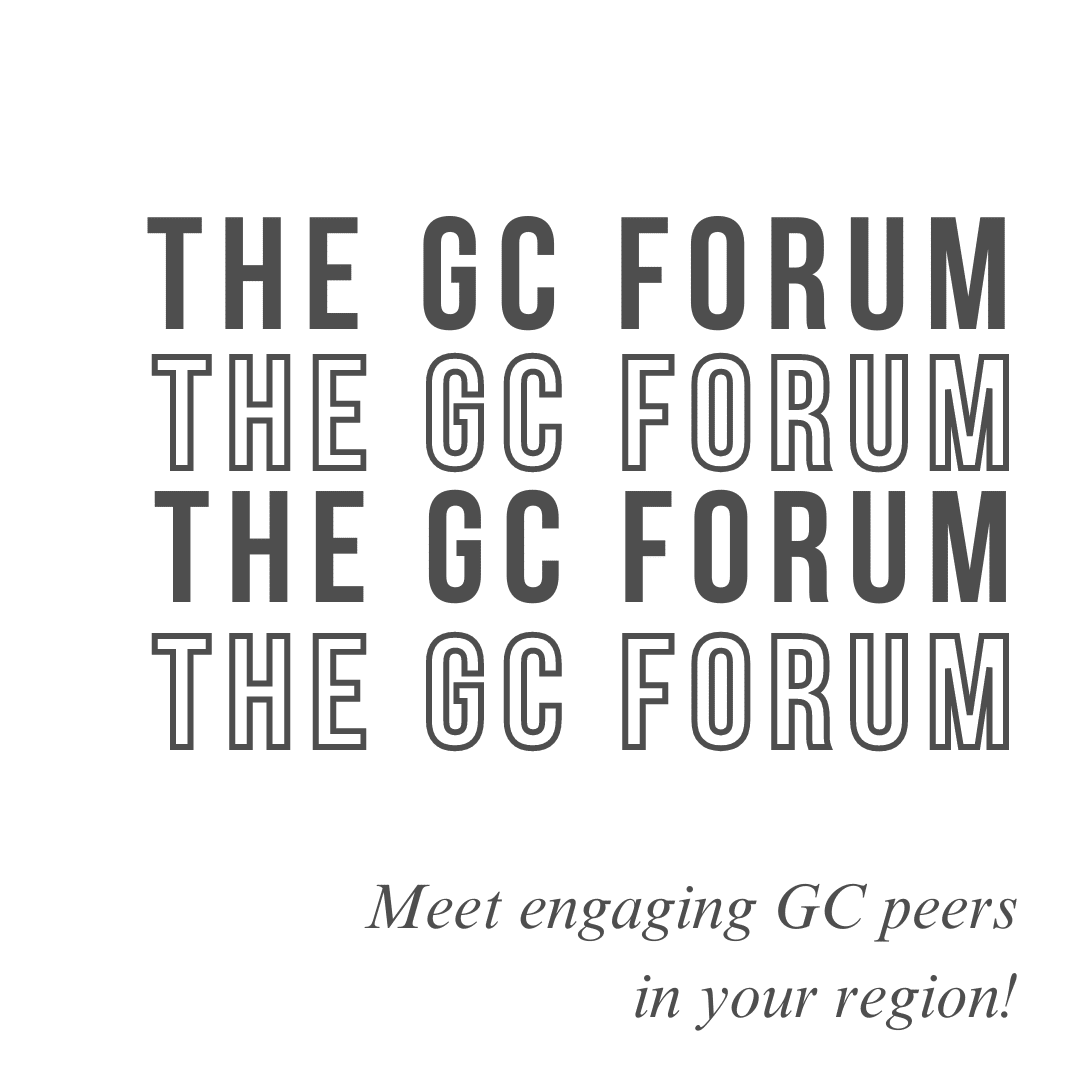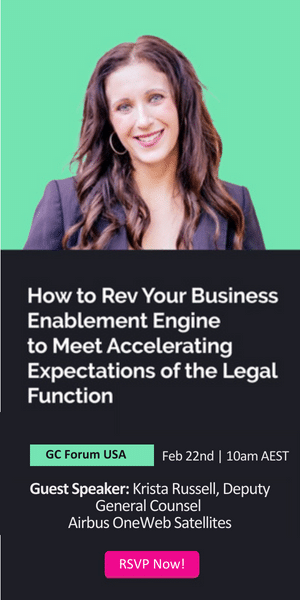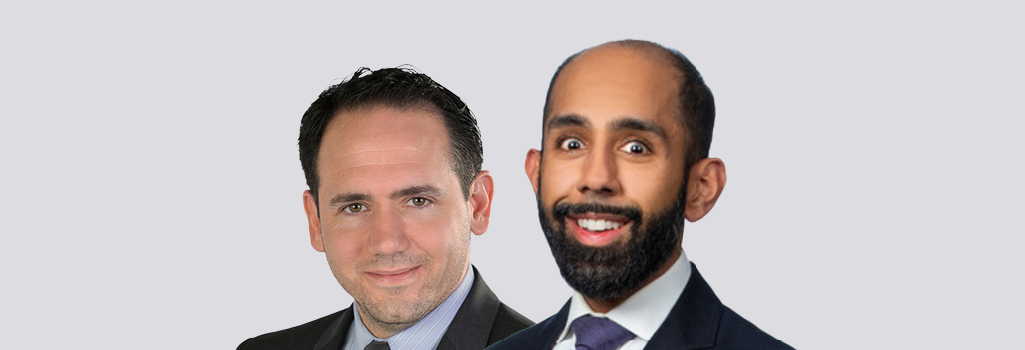The role of the GC originally was that of a lawyer first, but with some business knowledge. The addition of an in-house counsel was an economic decision. But today, the role has changed to one of an in-house counsel being a strategic business partner. In essence, a business executive with a legal background. With over 15 years of experience, Fernando increasingly sees, in addition to playing a key strategic role within their companies, the GCs wearing different hats and doing more with less.
Traditionally, the role of an inhouse lawyer and of lawyers generally was that of an I-shaped lawyer: meaning all your skills knowledge and background education were focused on the law and the practice of law.

Then the traditional role of lawyers and in-house counsel began to be challenged. Around the 2014, Armani Smathers and Peter O’Connor, working separately, began to look for an understanding of lawyers and in-house counsel as being broader than the traditional I-shaped mode. Through their work, the T-shaped lawyer developed in which legal knowledge was supplemented with skills, abilities and knowledge from many other departments. For example, the ability to understand financial statements, and the ability to see trends, project management, being able to leverage technology tools became increasingly important for a skilled and successful lawyer to be able to understand and work with. While a lawyer was not expected to be an expert in knowing how to code, having a fundamental understanding of technology to be able to have a conversation in that area was seen as key.

The Birth of the Plus-Shaped Lawyer
In 2017, Fernando wrote an article for Canadian Lawyer magazine that proposed a new model that included other components that he felt were essential for a successful GC and lawyer, which extended beyond the T-shaped lawyer model. These components included diversity and inclusion, having a highly developed EQ, understanding your awareness, and ways of achieving your objectives without being hardnosed about it or confrontational. These “soft skills” he noted were as critical for success as a lawyer as the traditional knowledge of the law or the other “harder” skills.
Fernando gave an example to support his position. He explained that he once worked with a lawyer, while at a power generation company, who was spectacular in storytelling and being able to explain difficult concepts in a way that made it simple to understand. This was a specific skill set that made him a successful lawyer. Fernando also points out that as you increasingly work with people and legal departments from around the world, understanding your customers and the people across the table and working with others who may have diverse backgrounds becomes much more important.
Building on the plus shaped and T-shaped models, the Delta model was developed and called a dynamic model. The contribution of the dynamic element was an interesting development. IT basically meant that if the GC were in legal ops, he/she may be more business and operations focused and less legal knowledge focused. Applying this to in-house counsel, a successfully counsel would be a person who is skilled at the law but also possesses those skills that used to be rated as soft skills such as how to deal with people, how to time manage and manage diversity, etc.

Acquiring the skills to become a GC early in your legal career.
Rustam recommends having a good understanding of the law. Being a junior lawyer is a toil and you need to put in your time as an articling student and become an expert. You also need to figure out if going in-house is for you.
Knowledge of the right business and operations really depends on which organization you’re joining. Whilst you must show an aptitude in learning business operations, it’s not something you necessarily have to know before joining the organization.
What did Volkswagen see in Rustam having spent 15 years in professional services, to invite him to move into automotive? He believes it was the skills shown in Fernando’s ‘+’ lawyer model: the soft skills of emotional EQ, empathy, storytelling and effective listening. The skill of relationship building also makes it easier to do your job building trust and loyalty with your team and with those you’re negotiating with.
Fernando advises being flexible, curious and willing to learn. He credits his strong background in labor and employment law to becoming a general counsel just two years after being called to the bar. He began his career with an employer who found value in his labour and employment law expertise. Once in, he was able to demonstrate hod worth and grow. He notes that by being curious, and developing relationships, you learn and constantly develop.
What Are You Doing to Stay Ahead?
Fernando points out that the in-house counsel sector is a small and friendly group and very supportive. When you first enter the legal profession, you don’t know anybody. The GC associations have great networking events, learning sessions and information sharing.
You’ll be surprised how often people are willing to share a template or provide you with a bit of a background. Finally, learn from somebody who might not be a lawyer. There’s a lot of knowledge base within your colleagues.
Rustam recommends the Canadian Corporate Counsel Association (CCCA) is a great organization to join for Canadian lawyers. The National General Counsel network is a relatively new organization that offers ways to talk about issues like diversity, equity and inclusion in their organizations externally. He suggests the Association of Corporate Counsel (ACC) for lawyers outside of Canada. He also recommends the Quorum Club as a great organization to get together in a confidential matter and discuss issues that affect all organizations. For example, your relationship with HR or what you are doing as corporate secretary to move the dial on governance issues. That is a great way to meet other people but also talking in a very informal and genuine manner about issues that affect all of us.
LinkedIn is spectacular in being able to develop a network of people you’ve never met in person before, says Fernando. He suggests building connections virtually first, and then in person at an event. You can look at your LinkedIn, check who in your network is actually there and invite them for a coffee. Those networks are valuable if you ever find yourself in litigation or requiring legal support in a particular country, you can reach out to a few people, and you can ask them for their advice.
Rustam also points out that he uses LinkedIn to read about new appointments or where the markets are moving. He believes in keeping informed about current affairs, the economy or the stock market make you a well-rounded individual that impacts the business outside of just the legal sphere.
There are also several newsletters including Mondaq which gets articles from other law firms or other organizations putting out thought leadership on specific legal issues.
Wearing Many Hats as General Counsel
As a general counsel it’s impossible for you to know everything.

Fernando likens the role to that of a general practitioner – a doctor – red-flagging a potential issue and sending them to the specialist. Being aware of changes happening in HR, cybersecurity or ESG governance, and compliance, where things are changing on a daily basis and where you may need to do a deer dive to learn more. Again, even at a superficial level to stay abreast of those fleeting issues – both parties recommend spending at least 30 minutes a day on LinkedIn to gather knowledge and remain up to date on the latest in 24-hours. And, if you are available, you can attend the Top 30 Things in ESG Right Now for GCs with Christine Uri, GC Forum USA session, Nov 9th at 9am EST. Register here.
Over the last 15 years, in addition to being a GC, Fernando has also had the role of corporate secretary, director of HR, corporate security officer and privacy officer. These roles require a much more regulatory and compliance focus than there used to be within the realm of GC.
It’s hard to keep up with everything so you must be willing to ask for help, to understand where the sources of information are and continuously want to improve how you do things.
As you achieve more within the company, people start taking advantage of it to the point where they don’t even review things, they you just send it to you. And you’re the first eyes on something that should be done by the business. So, you must push back and ask how urgent is urgent?
Setting Boundaries
As a new general counsel, it’s the time to hit the reset button and set expectations with clients and the legal team. Each work culture is unique. For example, some teams would call each other after hours on the weekends to talk about work-related stuff that could have easily been discussed during the workday. To avoid burnout, Rusty wanted his team to set boundaries with clients and with each other.
Skills For the GC Of Tomorrow
Together, Fernando and Rustam put together a list of necessary skill sets they believed would be required for for the GC of tomorrow. The skills include a growth mindset, ethics, cybersecurity and generative AI.
They insisted that these skills come with just being able to get curious, learning, sharing best practices and templates.
Rustam sees AI as the writing on the wall.
He tells a story of how a colleague copied a contract into ChatGPT and asked it to list the risks associated with the contract. It did great job of highlighting financial, operational, legal, reputational risks with headlines and great bullet points, probably better than a lawyer could do after spending the day looking at the contract. And this was done in seconds. Which brings us to AI Use Policy in-house, both parties agree employees are reaching to AI to beat timeframes on turn-around, but privacy and education how OpenAI works is a first step in ensuring that while AI provides short-cuts employees should avoid putting sensitive information into the tools.
Despite this example, Rustam doesn’t believe that lawyers are losing their jobs to generative AI. However, the job is changing. The question is how lawyers get ahead and continue to be an active contributor to their organizations. Rustam points to, for example, the events Exigent has lined up on AI, including Laura Jefford Greenberg on October 19th at 8:30am BST and Nina Stamell on incorporating AI into your in-house workflows Nov 30th, 9am AEST.
How do we continue to be an active contributor to our organisations
Make sure you are an enabler to the business says Rustam.
Having a growth mindset, adaptability, and not to act as a bottleneck where there’s a lineup of people waiting for you to get things approved or done. You’re there to help move the business forward, not be the ‘Department of No.’
GCs answer the same issues repeatedly such as: What can we not say in our advertisements? If you can educate the business so that they know answers to low risk but high frequency questions you’ve just empowered them, and you’ve also reduced your workload so that you can focus on other, higher risk and more strategic priorities. This is where a bit of technology can help, they’re called playbooks or virtual help desks where employees can self-serve some of their legal questions before running directly to legal to occupy their time.
Regarding tech.
Rustam argued ChatGPT will not be able to replicate the foundational concept of ethics and integrity. This is where the GC’s chief ethical officer role really comes into play; asking oneself what we should we be doing versus what are we allowed to be doing.
It’s important not to just stay in your lane as legal counsel, but to contribute to various other parts of the organization. – Rustam Juma, GC of Volkswagen Group Canada
AI cannot replicate leadership.
In-house counsel is lucky that they are the hub in the spoke of the company touching so many different areas of the business they are like the connector. It is on us to develop those networks within our organisations.
Your legal technology is not going to replace your job. But a lawyer who knows how to use the technology will.
Your legal technology is not going to replace you. But it is a tool, and you must be able to use that tool. Fernando remembers having a typewriter in high school and making the move to a CPU. It wasn’t easy but it did result in a lot of improvements in efficiencies, he says.
Sometimes you have to go out of your comfort zone and use the tools that are available to you because they’ll make you that much better at meeting your tasks.
On The Importance Training for Hard And Soft Skills
While employed at a previous employer, Fernando took a part-time MBA. Whilst you didn’t have to be a specialist at it, it did give him a pretty good understanding of what individuals in marketing do, as well as an understanding of statistics and financial statements.
Leadership is something you are always developing and develop your style and learn from others. You see how other people do certain things, and it influences yours. However, what might work in South America might not work in North America, in Europe or in Africa. The question is finding your own leadership, what makes you most comfortable and works best for your team and understanding that that might change depending on the team or work.
Join the GC Forum
 What is the GC Forum?
What is the GC Forum?
The GC Forum is a peer-to-peer community exclusive to corporate legal on legal transformation best-practices.
Hear war stories, successes, and tales of radical leadership to achieving legal transformation from GCs around the globe.
Join your region to get insights and contribute yours during closed-door GC Forum virtual roundtable sessions, workshops, and quarterly in-person conferences and social events.
To become a member register below….
Upcoming Events
| GC Forum UK: 19 Oct, 8:30am-9:30am BST |
|---|
 |
| How to Draft an AI Policy for Your Company (With examples that have worked) and ChatGPT vs. Claude Use Cases PART 1 of 2 |
| Guest Speaker: Laura Jeffords Greenberg, Fr. General Counsel, Worksome |
| RSVP Here |
| GC Forum APAC: 25 October, 9am AEST |
|---|
 |
| Top 5 You Have To Learn When Moving In-House |
| Guest Speaker: Nick Galloway, Regional Counsel PPG.com (ANZ and SEA) |
| RSVP Here |
| GC Forum USA: 9 Nov, 11am EST |
|---|
 |
| Navigating the ESG Horizon: What’s Next for GCs |
| Guest Speaker: Christine Uri, Advisor to In-House Legal Team on ESG, Fr. Chief Legal Officer, Top 100 Leader in Sustainability |
| RSVP Here |
| GC Forum APAC: 30 Nov, 9am AEST |
|---|
 |
| Setting the Stage for AI in Your Legal Department: How to Prepare, Launch and Integrate the Use of AI into Your Workflows |
| Guest Speaker: Nina Stamell, GC of MyHealth.net.au |
| RSVP Here |
| GC Forum AUS / APAC: 15th Feb, 8am-9am AEST |
|---|
 |
| The T-Shaped Team Framework: Why the T-Shaped Lawyer vision offers a game-changing new direction for your department |
| Featured Speaker: Peter Connor, 20 Years General Counsel Experience, Author, Speaker, Coach, Founder and CEO of Alternatively Legal |
| RSVP Here |
















